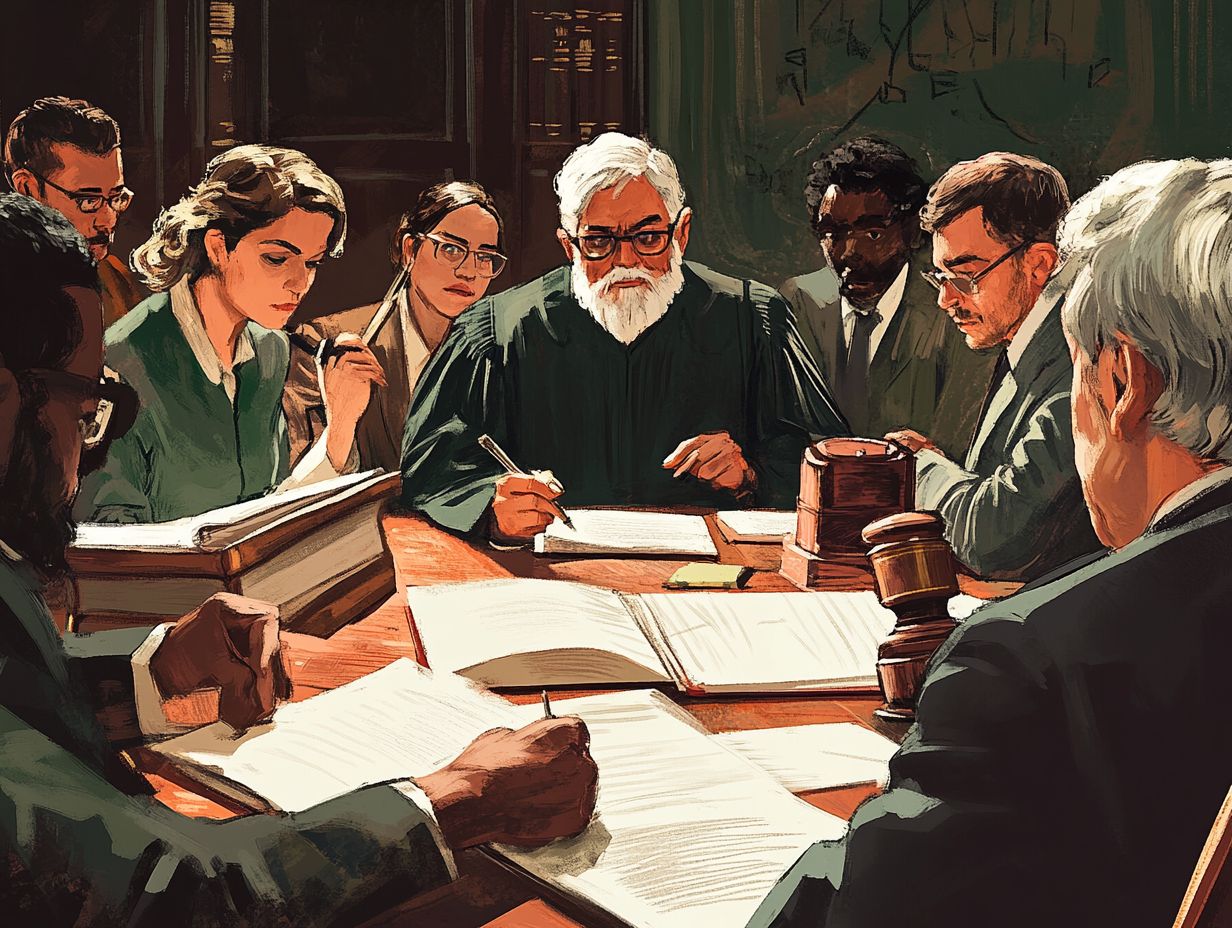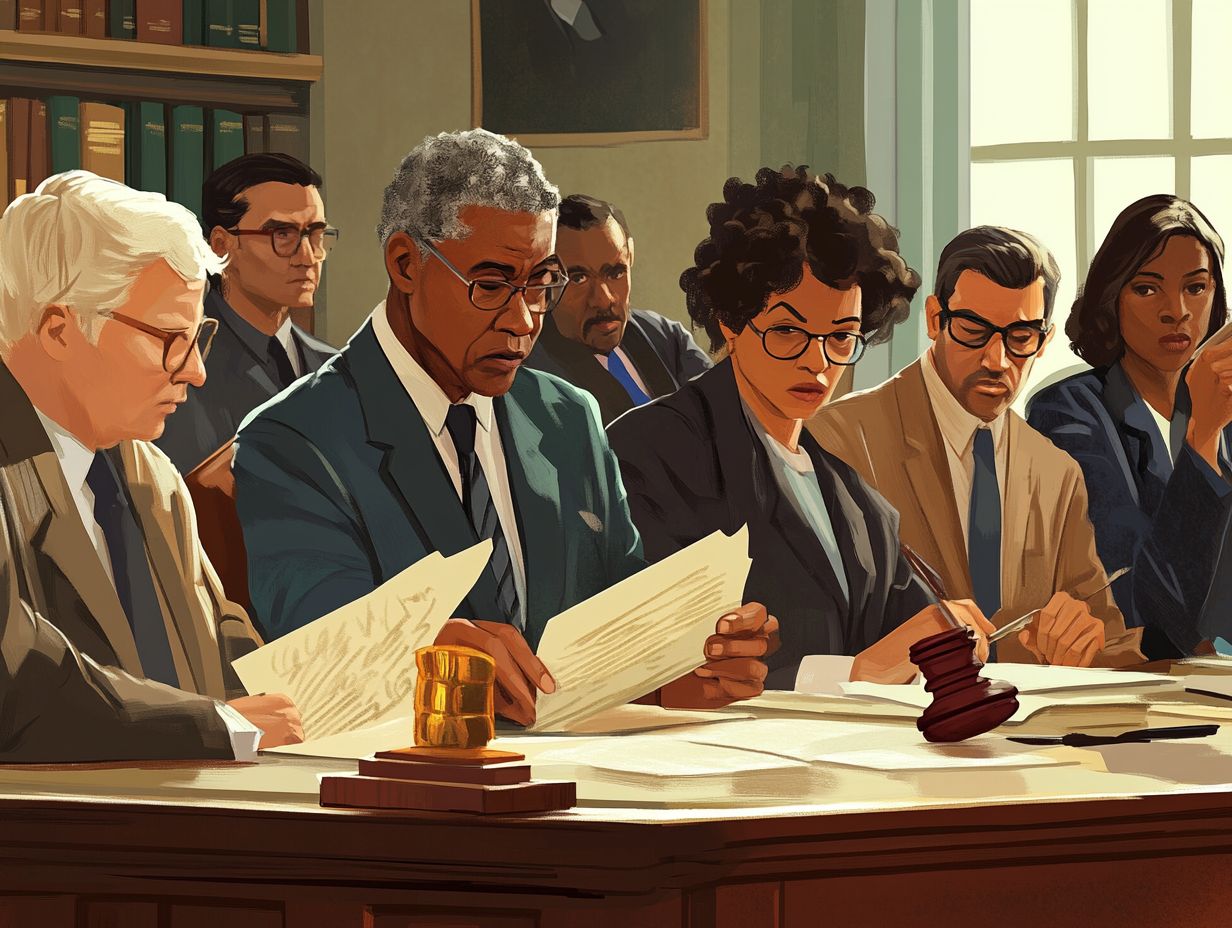How to Understand Jury Instructions?
Jury instructions play a pivotal role in the legal process. They serve as essential guides for jurors during their deliberations, ensuring that verdicts are fair and just.
Grasping these instructions can profoundly influence the outcome of a trial. They clarify legal terminology, define the responsibility to prove something in court, and outline the expected duties of jurors.
This article delves into the significance of jury instructions, detailing their key elements while offering tips for effectively navigating this crucial aspect of jury duty.
By enhancing your understanding, you can become a more informed juror and contribute to a just legal system.
Contents
Key Takeaways:

Understanding jury instructions is crucial for ensuring fair and just verdicts. Key elements include legal terminology, the responsibility to prove something in court, and the process for receiving and reviewing instructions.
To better understand and follow jury instructions, jurors should practice effective listening, note-taking, and collaboration with fellow jurors.
What are Jury Instructions?
Jury instructions are essential guidelines provided by a judge to jurors during the trial process. They convey the legal principles and definitions necessary for accurately evaluating evidence and delivering a fair verdict.
These instructions can differ by jurisdiction, making it vital for you to understand their significance in both criminal and civil trials.
Judges create these instructions to help you understand the case, ensuring that you grasp the foundational legal concepts specific to the matter at hand.
In the United States, you may notice that jury instructions tend to be more detailed and often originate from established model instructions.
In contrast, in the United Kingdom, emphasis is placed on your duty to remain impartial and act as the sole evaluators of the facts.
Australia strikes a balance between these approaches, offering comprehensive legal guidance while fostering the independence of jurors.
Understanding these differences can empower you to be a more effective juror! These nuances illustrate the significant variations across common law countries, emphasizing the importance of familiarizing yourself with local practices to fulfill your juror responsibilities effectively.
Importance of Understanding Jury Instructions
Grasping jury instructions is essential for ensuring that jurors fully comprehend their roles and responsibilities. This fosters a fair trial process.
These instructions are crucial in shaping the jury’s deliberation and directly impact the responsibility to prove something in court needed to arrive at a verdict.
Role in Fair and Just Verdicts
The role of jury instructions is vital in guiding you and your fellow jurors toward making fair and just verdicts. They provide essential clarity on legal standards and the judge s directives that must be followed during deliberation, while also addressing the act of jurors ignoring the law based on personal beliefs.
These instructions lay out the definitions of relevant laws, the burdens of proof, and the weight of evidence, ensuring that you fully grasp your responsibilities.
By comprehensively outlining these guidelines, jury instructions enable you to navigate complex evidence and legal nuances, fostering a knowledge-based decision-making process.
The implications of adhering to or disregarding these instructions can significantly influence the outcome of a case. When jurors, like yourself, choose to pursue jury nullification, there s a chance to disregard the law in favor of personal beliefs, raising questions about the integrity of the justice system and your accountability as a juror.
Understanding these nuances allows you to deliberate with both fairness and authority.
Key Elements of Jury Instructions
Key elements of jury instructions encompass essential legal terminology, precise legal definitions, and the burden of proof.
These components are meticulously crafted to assist jurors in effectively evaluating evidence throughout the trial process.
Embrace your role as a juror! Your understanding makes a difference in the justice system.
Legal Terminology and Definitions

Legal terminology and definitions in jury instructions are designed to clarify the intricate legal concepts you must grasp in order to evaluate evidence and reach a verdict. Mastering legal terms is not just beneficial; it s essential for making fair and informed decisions in court!
Take, for example, the phrase “beyond a reasonable doubt.” This establishes a vital standard of proof in criminal cases, ensuring you fully comprehend the significance of your decisions. Similarly, terms like “preponderance of the evidence” illuminate the varying standards of certainty required in civil cases, guiding you toward informed evaluations.
These legal definitions are essential for demystifying the evidence presented at trials. By understanding these key terms, you enable yourself to fulfill your crucial role in the judicial process.
Explanation of Burden of Proof
The burden of proof is a cornerstone concept woven into jury instructions. This means it s up to the prosecution or plaintiff to prove their case beyond a reasonable doubt in criminal trials or by a preponderance of evidence in civil trials.
This concept transcends mere legal formalities; it serves as a vital framework that shapes juror understanding and decision-making. You, as a juror, are responsible for evaluating the evidence presented.
Grasping the burden of proof is essential for accurately assessing the validity of the claims made. Articulating this concept clearly in jury instructions guides jurors through the intricacies of both criminal and civil law.
The effectiveness of this communication can profoundly influence the verdict, underscoring the significance of proficient legal communication in safeguarding the integrity of a fair trial.
Process of Receiving and Reviewing Jury Instructions
The process of receiving and reviewing jury instructions is a pivotal moment in the trial journey. Here, jurors are entrusted with essential directives that guide their decision-making and ensure they fully comprehend their responsibilities.
When and How Instructions are Given
Jury instructions are typically provided at the end of the trial process, just before you and your fellow jurors begin deliberation. This ensures that you fully grasp the legal standards you need to apply to the evidence presented.
These instructions are essential; they guide you through the decision-making process and clarify any complex legal concepts that may have emerged during the trial. By addressing the relevant laws and emphasizing the importance of impartiality, these directives shape your understanding.
The timing of these instructions allows you to consolidate your thoughts after hearing arguments from both sides, enhancing your ability to apply the law accurately. The clarity and comprehensiveness of these directives can significantly impact the deliberation phase.
Ultimately, this clarity influences the verdict you and your fellow jurors will deliver.
Clarifying and Asking Questions
As a juror, you have the invaluable opportunity to seek clarification on jury instructions by asking questions. This is essential for ensuring that you fully grasp the legal jargon and specific directives provided by the judge.
Engaging in this way not only helps you navigate complex terminology but also nurtures a deeper understanding of the nuances within the case. When you take the initiative to inquire about instructions, you enhance your comprehension of the legal principles at play.
A clear understanding is paramount, as it directly influences the fairness and accuracy of your verdict. By fostering a culture of inquiry, the judicial process creates a more informed jury, underscoring the significance of clarity in enabling jurors to fulfill their vital role in the justice system.
Tips for Understanding and Following Jury Instructions

To effectively understand and follow jury instructions, dive into techniques like active listening and careful note-taking! These skills will significantly enhance your capacity to understand the critical elements of the legal directives presented to you.
Effective Listening and Note-Taking
Effective listening and note-taking are essential! These skills enhance your comprehension of jury instructions and play a crucial role in making informed decisions during deliberations.
By refining these skills, you can actively engage with the material presented during the trial. This ensures you fully grasp the nuances of the legal arguments and evidence being discussed.
Techniques like summarizing key points, asking clarifying questions, and reflecting on the information can significantly improve your understanding.
Taking good notes helps everyone remember key details, avoiding misinterpretations and reinforcing the jury’s collective memory of the case.
In this way, effective listening and diligent note-taking are not just procedural tasks; they are vital to rendering a fair and just verdict.
Collaborating with Fellow Jurors
Collaborating with fellow jurors is essential to the jury deliberation process! It fosters open discussions about jury instructions and cultivates a shared understanding for more informed decision-making.
Teamwork enhances your understanding of complex legal language and ensures that diverse perspectives are woven into the conversation.
When you engage in dialogue with your peers, you can clarify any confusion surrounding the instructions. This ultimately streamlines the deliberation process.
Working together helps everyone make fair decisions, significantly influencing the verdict. Understanding the nuances of legal standards and evidentiary requirements becomes more attainable when you pool your insights, underscoring the critical importance of collaboration in the pursuit of justice.
Frequently Asked Questions
What are jury instructions?
Jury instructions are legal guidelines given by a judge to a jury during a trial. They provide jurors with the necessary information and rules to follow in order to reach a fair and just verdict.
Why is it important to understand jury instructions?

It is important to understand jury instructions as they are the basis for a jury’s decision in a trial. A clear understanding ensures that the verdict reached is fair and in accordance with the law.
Where can I find jury instructions?
Jury instructions can typically be found in written form and are given to jurors before deliberations begin. They may also be available online or through legal resources.
How can I best understand jury instructions?
The best way to understand jury instructions is to actively listen to the judge when they are being read and to take notes. It may also be helpful to ask for clarification if any instructions are unclear.
What should I do if I do not understand a specific jury instruction?
If you do not understand a specific jury instruction, it is important to speak up and ask for clarification from the judge. Ignoring or misunderstanding a crucial instruction could impact the outcome of the trial.
Can jury instructions be challenged or appealed?
Yes, jury instructions can be challenged or appealed if they are found to be incorrect or misleading. Attorneys may raise objections during the trial or file an appeal after the verdict has been reached.
Have more questions? Don t hesitate to ask!






